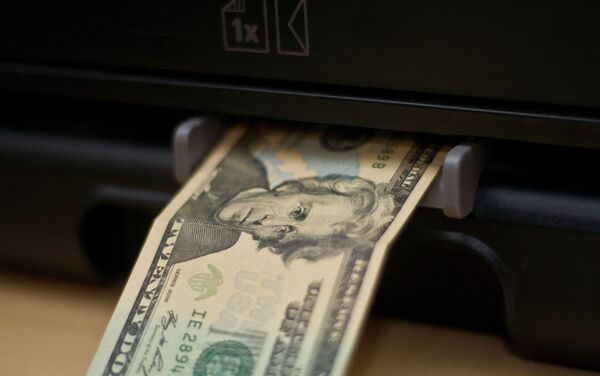Markets are apparently not affected by the stand-off between Russia and the West over the crisis in Ukraine or the absolute hell that has erupted in Iraq and Syria, compliments of the US State Department and the Pentagon. It was they that created the Islamic State (IS) which seems to be getting stronger not weaker while the "broad coalition" is bombing its positions in Iraq and beyond?
You would have expected all those Western investors and speculators to be going nuts, terrified at the thought of a big war breaking out in Europe, and more sanctions introduced against Russia that may backfire on all sorts of industries in the West even more. Not to mention that the IS victorious march could cause a regional war in the Middle East, with oil prices going through the roof. In the past it took a lot less to send Western markets into a frenzy, like some bad stats coming out of the US or the Eurozone, but these days they are keeping their cool for some odd reason, not a worry about the possibility of serious calamities breaking out in Europe and the Middle East..
So what's going on then? Well, in America the US Federal Reserve, a supposedly ‘central bank' which is actually run by a cabal of private bankers, has just finished injecting something like $3.8 trillion into the markets, buying up US Treasury IOUs and other paper assets, to boost liquidity and, supposedly, help the economy to recover. At some point the Fed were pumping something like $85 billion a month of new money into the markets which were absorbing them with such enthusiasm that you would think investors were desperate to pass it on to the real economy as soon as possible. Which, of course, didn't happen because quantitative easing in its modern version is to the real economy as impotence is to romance. (We will probably never know how much of that money reached the economy and how much was blown on all those fancy ‘financial products' that benefit no one but the speculators.)
And in Europe the European Central Bank, not to be outdone by the US Fed, printed its own trillions of new money, buying up bonds to ‘stimulate' the economy. And if the President of the European Central bank Mario Draghi is to be believed, then this feast for the money men and speculators is going to resume very soon, and the markets would be absorbing more billions in newly printed euro bills, even though the previous bout of QE didn't do much for the European economy which is currently teetering on the brink of recession.
Incidentally, here's the funny bit about the QE in the US and the EU: in both entities, if you pardon the expression, the rate of inflation has not experienced any effect whatsoever from the influx of those trillions of new crispy notes. (Well, they are mostly electronic money, but it is still new money.) That side of things is absolutely confusing and basically denounces everything that we knew about inflation. That it goes through the rough when the money supply overruns the volume of goods and services on offer. But hey, we live in a brand new world where old habits die quickly and new realities are created practically daily.
So on the basis of all of the above, we can conclude, ladies and gents, that the world economy has become a virtual one, with politicians and bankers basically doing whatever they want and not even bothering to explain themselves. National debts are now measured in many trillions and stand no chance of getting repaid, but does anyone care? Nope, no one cares at all.
America's national debt will have reached $22 trillion by the time President Obama steps down in 2017, to devote himself to more golf, but all the talk is how the economy is recovering at the moment. Even though it isn't really because all that ‘recovery' is eaten up by paying interest on the debt. The same goes for Britain, the supposedly ‘booming' economy of Europe. The government borrows more than £100 billion a year and its overall national debt is around £5 trillion, but no one seems to mind and the talk is of a bright new future.
And if you add to that that hundreds of millions of people across the Western world are in debt up to their eyeballs, and lenders are charging extortionate rates then all this so-called recovery doesn't look like recovery at all, now does it?
So my prediction is this: we are heading for another financial crash which will hit us in the next couple of years. And guess what will happen then? The taxpayers will be bailing out the banks once again and more new money will be printed. And that is why the markets, which are inhabited by people who know this, are feeling confident.




